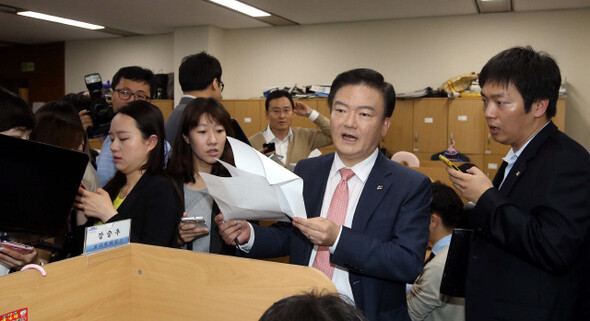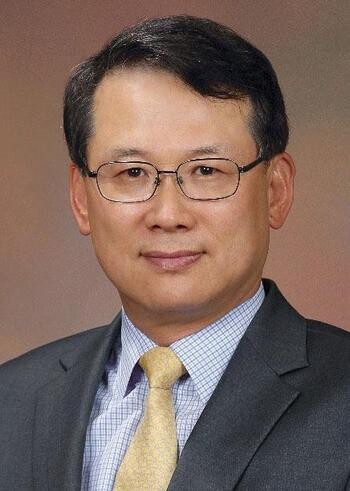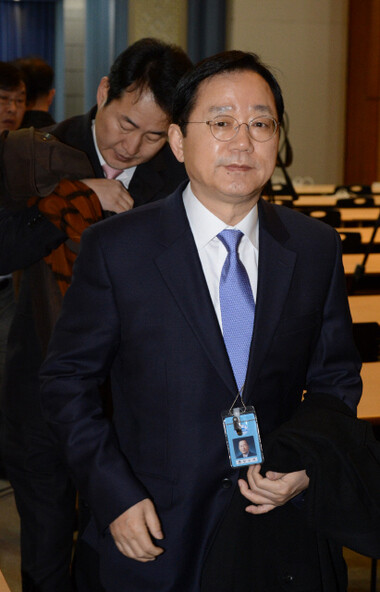hankyoreh
Links to other country sites 다른 나라 사이트 링크
In S. Korea, journalism acting as a stepping stone to power

By Lee Jung-gook, staff reporter
A debate over so-called “poli-nalists” is heating up after the June 10 nomination of YTN Plus president Yoon Doo-hyun to serve as Blue House senior secretary for public relations.
It’s the third time since President Park Geun-hye took office that a media figure has been tapped to work in the Blue House, coming after the hiring of Min Kyung-wook as a Blue House spokesperson and Lee Nam-ki as Yoon’s predecessor as senior public relations secretary.
A coinage combining the words “politics” and “journalist,” “poli-nalist” is used to refer to media figures with ambitions of power, journalists who ignore the press’s obligations to be critical of power and remain neutral and opt instead for their own political careers. Experts are saying the problem is especially serious in South Korea, where it is degrading popular trust in the press.
■ A more serious problem in South Korea?
Other developed countries have examples of journalists who went on to political careers. Winston Churchill, the British Prime Minister, had previously been a war correspondent for the Morning Post; current Mayor of London Boris Johnson was once a reporter with The Times. David Gergen, a onetime White House spokesperson under the Clinton administration, had served as editor-at-large of the US News and World Report magazine.
But experts said the situation in South Korea is different. Examples of a current journalist making a beeline for politics are highly exceptional in other major countries.
“The role of the media is to monitor and check those in power, but in South Korea there’s a widespread culture of people viewing the job of journalist as a stepping stone to power,” said Choi Jin-bong, a media studies professor at Sungkonghoe University.
“In developed countries, the idea of a current journalist going immediately into politics is viewed as an embarrassment,” Choi added.
This means that no parallels can be found in those countries for a career trajectory like that of Min Kyung-wook, who went from hosting the KBS news one day to serving as Blue House spokesperson the next.
“Most famous journalists in the developed countries focus on writing after they retire,” said Daegu University media studies professor Kim Sung-hae, giving the example of Carl Bernstein, one of the reporters responsible for bringing the Watergate scandal to public attention in the 1970s.
“The ambitions of power among South Korea’s ‘poli-nalists’ is eating away at trust in the press as a whole,” Kim added.

■ Why does the Blue House go for journalists?
Just in the 27 years since South Korea became a democracy, quite a few journalists have gone straight to jobs in the Blue House. During the Kim Young-sam presidency (1993-98), Chosun Ilbo editorial board member Ju Don-sik was tapped as senior secretary for political affairs. Under successor Kim Dae-jung (1998-2003), the same position was filled by KBS newsroom chief Cho Sun-yong. Kim Eun-hye, anchor for the MBC network, became a deputy spokesperson under the Lee Myung-bak administration (2008-13), while Joong-Ang Ilbo senior editorial writer Kim Du-woo also took a job at the Blue House. The history suggests that the press has long been a major pathway to the country’s political elite.
“All the leading lights in the Blue House right now are either prosecutors or journalists,” said Rhee June-woong, a communications professor at Seoul National University.
“Nowhere else in South Korea will you find hierarchies as strong as the ones of the prosecutors and the press,” Rhee added. “For an administration that needs loyal staffers to do its bidding, it’s a no-brainer.”
This suggests that the same reporters whose job is ostensibly to monitor those in power can also be viewed as having the makings of faithful minions. The nomination of former Joong-Ang Ilbo editor-in-chief Moon Chang-keuk to serve as Prime Minister has been read along similar lines. Some observers are saying that having failed to distinguish themselves with their policies, the conservative administrations are resorting to stronger public relations efforts, resulting in ever more examples of the “poli-nalist” breed.

■ What is needed, institutional improvements or changes to media culture?
Many are calling for stronger institutional safeguards to prevent the “poli-nalist” phenomenon from growing, including a possible amendment of the Public Service Ethics Act. Others contend that the problem requires more than just a legal solution.
“Over the years, South Korea has depended exclusively on autonomous regulations among journalists themselves,” observed Choi Jin-bong. “The time has come for institutional changes, such as amending the Public Service Ethics Act to ban former journalists from holding public positions, at least for a limited time.”
When Min Kyung-wook went to work as a Blue House spokesperson, KBS’s own internal ethics guidelines made little difference. Those guidelines state only that the hosts of current affairs programs and political journalists cannot engage in political activities within six months of leaving their posts.
A debate remains over whether journalists should be seen as public officials, and some have suggested than any bans could infringe upon freedom of choice in employment.
Rhee June-woong suggested one alternate solution to the problem.
“We would need to create a culture where there is enough social compensation to motivate journalists to stay in their field,” Rhee said.
Please direct questions or comments to [english@hani.co.kr]

Editorial・opinion
![[Column] Welcome to the president’s pity party [Column] Welcome to the president’s pity party](https://flexible.img.hani.co.kr/flexible/normal/500/300/imgdb/original/2024/0515/3917157400447943.jpg) [Column] Welcome to the president’s pity party
[Column] Welcome to the president’s pity party![[Editorial] Korea must respond firmly to Japan’s attempt to usurp Line [Editorial] Korea must respond firmly to Japan’s attempt to usurp Line](https://flexible.img.hani.co.kr/flexible/normal/500/300/imgdb/original/2024/0514/2317156736305813.jpg) [Editorial] Korea must respond firmly to Japan’s attempt to usurp Line
[Editorial] Korea must respond firmly to Japan’s attempt to usurp Line- [Editorial] Transfers of prosecutors investigating Korea’s first lady send chilling message
- [Column] Will Seoul’s ties with Moscow really recover on their own?
- [Column] Samsung’s ‘lost decade’ and Lee Jae-yong’s mismatched chopsticks
- [Correspondent’s column] The real reason the US is worried about Chinese ‘overcapacity’
- [Editorial] Yoon’s gesture at communication only highlights his reluctance to change
- [Editorial] Perilous stakes of Trump’s rhetoric around US troop pullout from Korea
- [Guest essay] Preventing Korean Peninsula from becoming front line of new cold war
- [Column] The state is back — but is it in business?
Most viewed articles
- 1[Column] Welcome to the president’s pity party
- 2Could Korea’s Naver lose control of Line to Japan?
- 3US has always pulled troops from Korea unilaterally — is Yoon prepared for it to happen again?
- 4[Editorial] Transfers of prosecutors investigating Korea’s first lady send chilling message
- 5[Column] Will Seoul’s ties with Moscow really recover on their own?
- 6Major personnel shuffle reassigns prosecutors leading investigations into Korea’s first lady
- 7Naver’s union calls for action from government over possible Japanese buyout of Line
- 8[Correspondent’s column] The real reason the US is worried about Chinese ‘overcapacity’
- 9[Editorial] Korea must respond firmly to Japan’s attempt to usurp Line
- 10Number of foreign residents in S. Korea triples over ten years